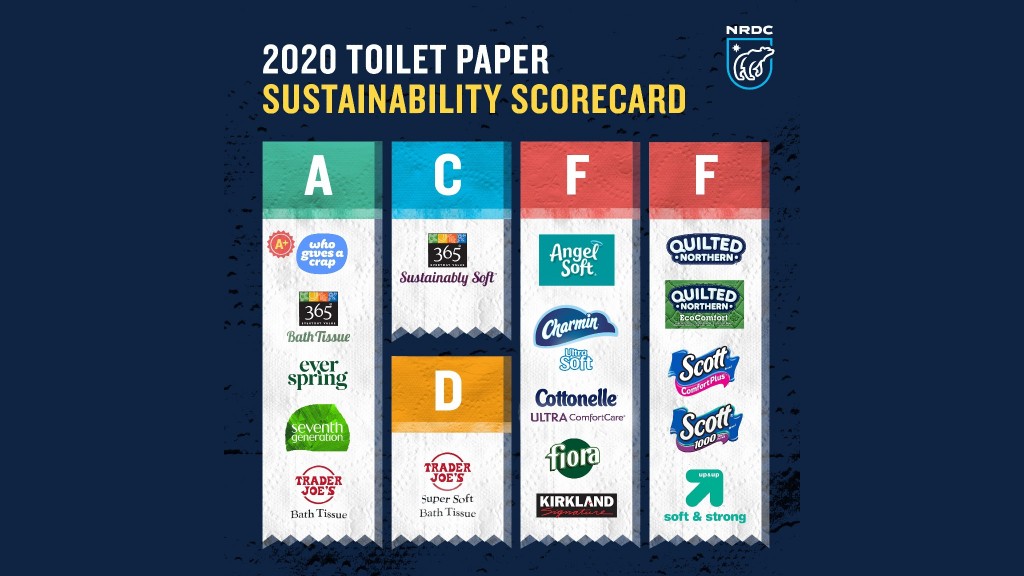
NRDC (Natural Resources Defense Council) has released an updated analysis of the climate impacts caused by the "tree to toilet" pipeline destroying the climate-critical Canadian boreal forest. The "Issue with Tissue 2.0" report includes a new sustainability ranking for toilet paper brands and other tissue products made by major U.S. producers.
While toilet paper's emergence as one of the most sought-after products in America was an unexpected side effect of COVID-19, the toilet paper shortage has brought to the forefront the urgency of creating a more sustainable, resilient means of production of tissue products. Currently, the industry clearcuts one million acres of boreal forest each year - leading Canada to rank third globally, behind Russia and Brazil, in terms of global intact forest loss - in part to produce pulp that U.S. tissue makers roll into the ultimate disposable product: toilet paper.
"By making toilet paper from ancient forests essential to the climate fight, tissue companies are flushing away our forests and our planet's future," said Shelley Vinyard, NRDC's Boreal Campaign Manager and report co-author. "Instead of exacerbating the climate crisis, companies like Procter & Gamble must take urgent action to create more sustainable products. Our planet has no time for the largest companies in the world to take half-measures or deflect blame," said Vinyard.
NRDC's 2020 scorecard ranks 26 toilet paper brands, giving an A or A+ score to 11 brands, including the new winner "Who Gives A Crap," which received the top grade for its rolls made of 100 percent recycled materials, including 95 percent postconsumer recycled product. Major brands -- Charmin, Cottonelle, and Quilted Northern -- bring up the rear with F grades, because they are made entirely of virgin forest fiber. NRDC evaluated facial tissue and paper towel brands, as well.
Together with Indigenous leaders and other partners, NRDC is pushing U.S. tissue makers like Procter & Gamble to take steps to minimize their impact on the planet, including sourcing half or more of their pulp from post-consumer recycled content, which would save at least 1.6 million tons of virgin wood from being turned into throwaway tissue products every year.
Mandy Gull, Deputy Grand Chief of the Cree Nation, said, "The Cree Way of Life is inextricably tied to the boreal forest of our territory of Eeyou Istchee. Unsustainably-sourced tissue products come at the cost of intact forests that are fast disappearing and, once cut down, are never the same. We are already feeling the impacts of climate change on our land, and the loss of our forests will only make this worse. The health of the life-giving forest and its animals is linked to our own, along with the health of our children and our children's children. We must create a different narrative of how we live with each other on this Earth, starting by protecting the trees, animals, and people who inhabit the forest."
"The Canadian federal government often touts its ‘green' tree-planting initiatives, and the logging industry sings a similar tune about its ‘sustainable' image. But in reality, the Canadian government has failed to protect endangered species habitat and continues to allow logging companies to destroy large swaths of the Canadian boreal, one of the largest intact forests and one of the most carbon-rich forests in the world. It's ridiculous to claim we're planting trees while we're also mowing down old-growth forests for toilet paper," said Tzeporah Berman, International Program Director for Stand.earth.
Toilet paper releases carbon with every flush, landing major U.S. tissue makers in the hot seat for their role in turning Canada's boreal forest from a climate asset to a liability.
"With every roll of their unsustainable toilet paper, companies are pushing the world closer to climate catastrophe. That's because climate change isn't just about smokestacks and tail pipes, or oil wells and coal mines. It's also driven by cutting down irreplaceable climate-critical forests like the Canadian boreal for something as short-lived as a flush," said Jennifer Skene, an attorney with NRDC's Canada Project and report co-author.
In addition to challenging major tissue brands to add post-consumer recycled pulp to products, NRDC also calls on tissue makers to invest in recycled and alternative fiber research and stop sourcing tissue pulp from critical habitats of threatened species and areas where logging companies have not obtained free, prior and informed consent before operating in the traditional lands of Indigenous Peoples.


